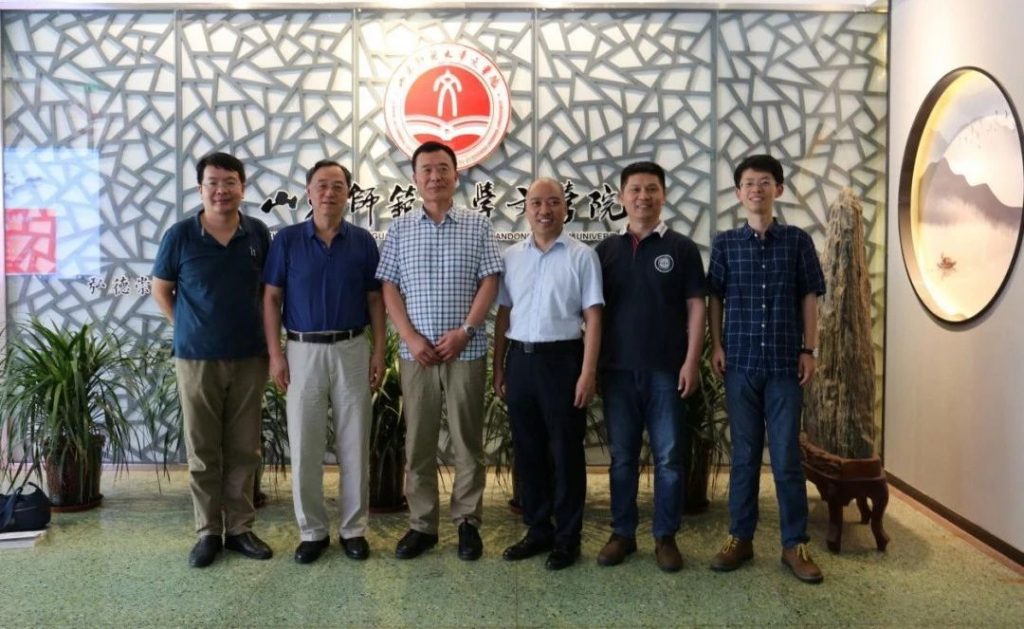Leap-forward Pause – The Creation View of Bie-Modernist Aesthetics
On the morning of June 30, Professor Wang Jianjiang of Shanghai Normal University was invited to be a guest at the School of Literature, Shandong Normal University, and gave an academic lecture titled “Leap-forward Pause – The Creation View of Bie-Modernist Aesthetics” in the 3134 Teaching and Research Room on the third floor of the teaching. The lecture was presided over by Professor Li Hui from the School of Literature of Shandong Normal University. Dean of the Faculty of Arts, Professor Sun Shuwen, Professor Zhou Junping, Professor Li Hongchun, Professor Han Cunyuan, and some doctoral and master students attended the lecture.
The lectures mainly focus on the concept of “Bie-modernism”. Professor Wang Jianjiang gave a vivid and in-depth discussion from five perspectives: the overview of Bie-modernism, the theoretical category of Bie-modernism, Bie-modern art and Bie-modernist art, Leap-forward pause and cutting, and the semantic development of “Bie” in the West.
Professor Wang Jianjiang introduced that the article on this theory was first read at the Sino-Russian high-level cultural forum co-sponsored by the Russian Ministry of Culture, the China Central Compilation and Translation Bureau and Shanghai Jiaotong University in October 2014. The article was officially published in “Exploration and Free Views” in December of the same year, and aroused the attention and discussion of the literary, philosophical, and artistic circles at home and abroad.
Professor Wang Jianjiang believes that Bie modern status quo is a kind of doubtful modernity, which is mainly manifested in the mixed social conditions of “pre-modern, modern and post-modern” in third world countries. Bie-modernism, on the other hand, manifests itself as a tendency not to be satisfied with Bie-modern’s mixed status quo, but to reflect, criticize, and renovate it. In addition, Professor Wang also combed the connotation of the word “别” from the aspect of “etymology”.
Professor Wang Jianjiang further clarified the theoretical category of Bie-modernism. He introduced a series of concepts derived from the perspective of Bie-modernism, such as Bie-modern, Bie-modernism, Bie-modernity, the time spatialization theory, the theory of historical development stages, the theory of harmonious conspiracy, and the theory of Leap-forward pause. These concepts are, on the one hand, concrete manifestations of Bie-modernism and, on the other hand, extensions of it. Afterwards, Prof. Wang introduced the related theories proposed by Western scholars, including Aleš Erjavec’s “philosophical quadrilateral theory” and the “philosophical moment” theory relayed by Rok Benčin.
Immediately afterwards, Professor Wang Jianjiang pointed out that there is a difference between Bie-modern art and Bie-modernist art at the artistic level. The former refers to a mixture of different arts with strong variations. For example, hybrid buildings in the construction industry. The latter is a new art theory, that is, it mixes artistic techniques, but reflects and criticizes Bie-modern concepts.
In the end, Professor Wang Jianjiang concluded that the reason why Bie-Modern Theory was able to quickly get a response in the United States and Europe was not only because of the originality of the theory, but also because of the revolution of the way of thinking by leaps and bounds, which is the product of free competition in the ideological market. Only on the basis of distinguishing between true and false modernity and free creation of ideas can we truly go to the world and influence the world.
In the free discussion session, Wang Jianjiang had a lively exchange and discussion with the teachers and students present. Professor Li Hongchun said that Professor Wang’s lecture was very inspiring, and raised some questions, such as “how to understand its critical inheritance at the theoretical level and whether it can be used as a benchmark for Chinese academics to go global”, “how to interpret the Western scholars’ interest in ‘Bie-modernism’ “. Wang Jianjiang agrees with Professor Li Hongchun’s recognition that he may contribute to Chinese academics. He also pointed out that the theoretical motivation of the West is to seek new theoretical breakthroughs in the international arena under the ageing situation of European theories.
Afterwards, Mr. Han Cunyuan believed that the theory showed distinct comparative thinking, and raised the question of “how to basically define pre-modern, modern and post-modern from this perspective”. Professor Wang Jianjiang believes that modernity includes natural capital, welfare capital, rationality and instrumental rationality, etc. China is still on the road of modernization and has not yet completed modernization. Professor Wang Jianjiang also answered the question raised by Dr. Zhao Hongfang, “How to implement the Leap-forward Pause in literature research”. Professor Wang believes that the more important thing for Leap-forward Pause to be implemented in literary research is the awareness of the problem, and at the same time, it is necessary to have a negative attitude towards it. And on the basis of its comprehensive research, and then cut with the predecessors.
Finally, Professor Zhou Junping made a concluding speech. He first reviewed the research process of the theory, and highly affirmed the originality and inspiration of Professor Wang’s academic approach, that is, the pursuit of unconventional and distinctive self-views.
After that, he summarized the theory from three aspects: First, the theory is more of a social theory, and its difficulty lies in the social situation (hybridity) rather than in the level of aesthetic art, and emphasizes pause, rupture, and separation;Second, the theory is a grand construct, and there is room for further clarification in its details;Third, the scope of application of this theory is not limited to China, but can include most developing countries. Zhou Junping believes that the theory has a clear sense of innovation and is likely to be a faction of its own. He suggested that the construction can be strengthened on the one hand, and the influence can be expanded through various academic exchanges on the other hand. This academic report ended successfully with warm applause.


